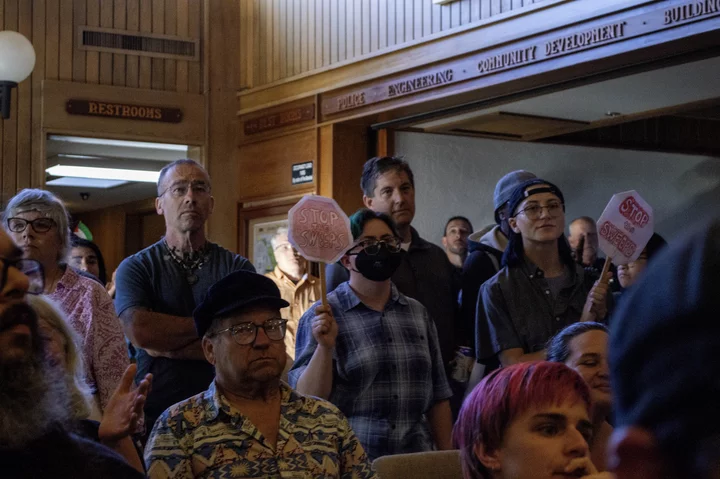A group of people at an August city council meeting.
The Arcata City Council may have had enough.
Item 11.b on Wednesday’s agenda would, if passed, edit the City Officials’ Protocol Manual to eliminate the option to comment on the city council meetings virtually; it’d require people to attend the meetings in-person if they wish to comment at all.
The public comment section near the beginning of the meeting after the staff reports would also be discarded, leaving one period for three-minute comments closer to the end of the meeting.
The proposed amendment would also add a section on when it’s acceptable to remove unruly participants from public meetings: speaking without the council’s recognition or outside of their allotted time, making threats, or delaying a meeting are all fair game for getting kicked out, though any behavior that disrupts the “orderly conduct” of a meeting would count. Rule-breakers get one warning and then an (optional) second one before being asked to leave, or if that fails, an escort out.
These restrictions come a few months after dozens of activists crashed and neutered a couple city council meetings, screaming and berating city officials and council members. Commenters have been able to call in via phone or Zoom since the pandemic, which some city employees privately blamed for fostering a culture permissive of anonymous personal attacks on other commenters and policy-makers alike. Some commenters also sometimes speak virtually multiple times at a meeting.
“Eliminating Zoom comments ensures that all participants are treated equally and that the Council can efficiently conduct its business,” reads a staff report on the item.
Legally, Arcata doesn’t have to offer virtual options for public comment. Senate Bill 707, which just passed last month, doesn’t force councils that govern cities with fewer than 30,000 people to do so.
Mayor Alex Stillman said during a phone interview yesterday with the Outpost that many of the virtual callers weren’t talking about city-related matters; many often focused on global politics.
She said that if someone was disabled and couldn’t make it to a meeting but wanted to comment, the city would be able to accommodate them in some way. Stillman said she’d made house calls over the years to concerned citizens and that emailing or calling council members on the phone was still an option.
Stillman said that the elimination of the public comment section early in the meeting was kind of a return to the status quo. It was added in the late 2000’s when the council meetings often stretched late into the night to make sure concerned residents didn’t have to stay until the end of the meeting to comment. Now, most council meetings only last until about 8:30. She also pointed out that the virtual comment option was only added a few years ago, and people managed to go decades without it.
“Change is hard,” Stillman said. “And that’s all we’ve got in life, is change…So I think all in all, we’re just going back to the way it was for years in the past.”

CLICK TO MANAGE